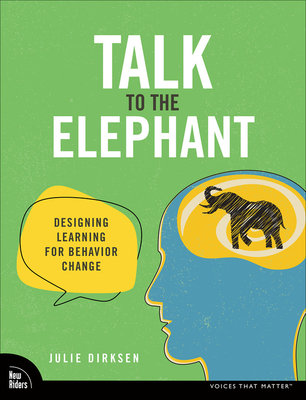Talk to the Elephant: Design Learning for Behavior Change

Talk to the Elephant: Design Learning for Behavior Change
What do you do when your learners know what to do but still aren't doing it?
Training is created with the goal of changing learners' behaviors, but anyone who has created learning experiences knows that there's a big gap between knowing and doing. You can create an engaging learning experience that informs and helps people remember, but often those people go back to their regular world and continue to do things the same way they always have.
In the last few decades, the fields of psychology, behavioral economics, and other behavioral sciences have brought an enormous amount of scientific research into helping people with behavior change. Only a fraction of that research has made its way back into learning design.
Talk to the Elephant: Design Learning for Behavior Change shows you how to add critical tools to your learning design toolbox to affect behavior change. You'll find out how to use frameworks and strategies from behavioral science to help you research and analyze challenges, feel more confident that you're solving the right problem, and design and test solutions that can help people with difficult behavior changes.
By the end of this book, you'll be able to
- Map the change journey of your learners and identify their path
- Assess and clearly communicate the value of the change
- Use motivation models to better understand what learners really care about
- Utilize evidence-based models like the COM-B Model to analyze behavior-change challenges
- Use a diagnostic checklist to determine whether you actually have a training problem
- Identify behavior-change techniques to address your specific challenges
PRP: 387.42 Lei
Acesta este Prețul Recomandat de Producător. Prețul de vânzare al produsului este afișat mai jos.
309.94Lei
309.94Lei
387.42 LeiLivrare in 2-4 saptamani
Descrierea produsului
What do you do when your learners know what to do but still aren't doing it?
Training is created with the goal of changing learners' behaviors, but anyone who has created learning experiences knows that there's a big gap between knowing and doing. You can create an engaging learning experience that informs and helps people remember, but often those people go back to their regular world and continue to do things the same way they always have.
In the last few decades, the fields of psychology, behavioral economics, and other behavioral sciences have brought an enormous amount of scientific research into helping people with behavior change. Only a fraction of that research has made its way back into learning design.
Talk to the Elephant: Design Learning for Behavior Change shows you how to add critical tools to your learning design toolbox to affect behavior change. You'll find out how to use frameworks and strategies from behavioral science to help you research and analyze challenges, feel more confident that you're solving the right problem, and design and test solutions that can help people with difficult behavior changes.
By the end of this book, you'll be able to
- Map the change journey of your learners and identify their path
- Assess and clearly communicate the value of the change
- Use motivation models to better understand what learners really care about
- Utilize evidence-based models like the COM-B Model to analyze behavior-change challenges
- Use a diagnostic checklist to determine whether you actually have a training problem
- Identify behavior-change techniques to address your specific challenges
Detaliile produsului









